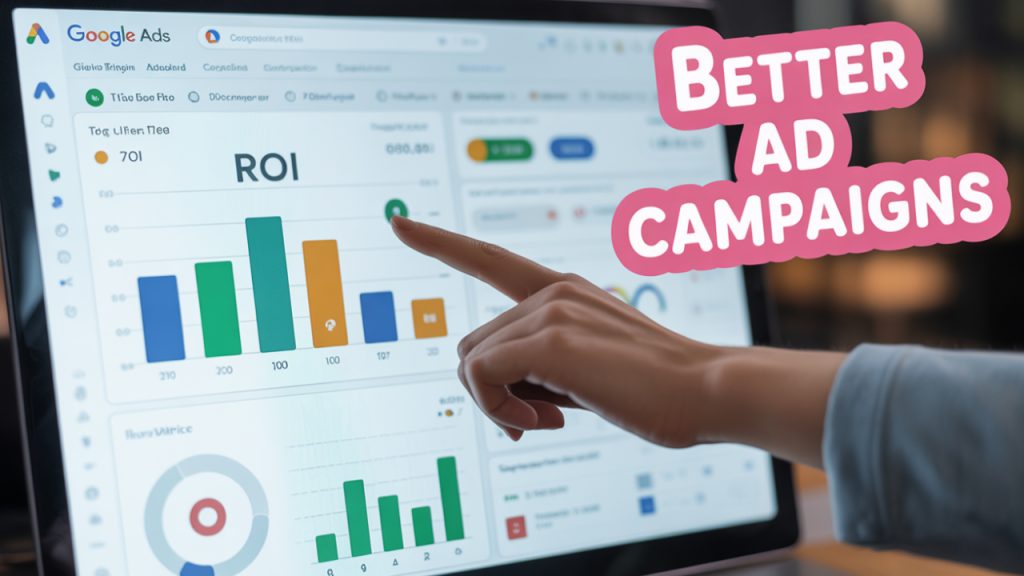Introduction
Digital marketing is now a need rather than an option in today’s difficult economic environment. Google Ads is one of the most effective platforms for generating leads and driving targeted visitors out of all the options accessible. Ads by themselves, however, are insufficient for success; campaigns must be optimised to maximise Return on Investment (ROI).
This blog highlights the importance of digital marketing in enhancing your overall performance while examining practical methods for optimising return on investment using Google Ads.
Why Google Ads is Crucial in Digital Marketing
Digital marketing plans for companies of all sizes revolve around Google Ads. It enables brands to:
Reach prospective clients at the precise moment they are looking for goods or services.
Utilise flexible budgets to manage advertising expenditures.
Use comprehensive analytics to monitor performance in real time.
Campaigns should be scaled according to objectives, such as brand awareness, leads, or sales.
Google Ads may be a powerful means of income development when incorporated into a larger digital marketing plan.
Steps to Maximize ROI with Google Ads
- Define Clear Campaign Goals
Establish your definition of success before you spend a dime. Typical objectives consist of:
Creating Leads
Increasing sales online
Increasing the number of visitors to websites
Increasing recognition of the brand
Setting a specific goal helps you focus your digital marketing efforts on quantifiable results, which facilitates performance optimisation.
- Conduct Thorough Keyword Research
The cornerstone of Google Ads is keywords. Researching keywords effectively benefits you:
Use the search phrases that your target audience employs.
Use negative keywords to prevent clicks on irrelevant content.
Maintain a balance between expensive long-tail terms and high-intent keywords.
Building a keyword plan that increases return on investment requires the use of tools like Ahrefs, SEMrush, and Google Keyword Planner.
- Optimize Ad Copy for Conversions
Excellent advertisements inspire action in addition to clicks. To optimise return on investment:
Make use of powerful headlines that contain your target term.
Emphasise your USPs (unique selling points).
Include an effective Call-to-Action (CTA), such as “Get a Free Quote” or “Buy Now.”
Make use of ad extensions (structured snippets, callouts, and sitelinks).
Your digital marketing budget will produce high-quality leads if your ad material is well-written.
- Enhance the Experience of Landing Pages
Even though your ad receives a click, the visitor is converted via the landing page. Pay attention to:
Rapid load rates
Reactivity on mobile devices
Ad-aligned messaging that is clear
Simple, unobtrusive design
Distinguished CTAs
Quality landing pages are rewarded by Google with better Quality Scores, which reduces your cost per click (CPC) and increases return on investment.
- Apply Smart Bidding Techniques
Target ROAS (Return on Ad Spend) and Target CPA (Cost Per Acquisition) are two examples of automated bidding options available through Google Ads. These optimise bids in real time through machine learning.
Spending prudently on advertisements that truly convert is ensured when you combine smart bidding with your digital marketing data
- Use Targeting Audiences
Targeting based on demographics, interests, or online behaviour is made possible by audience segmentation. Among the options are:
Remarketing lists (displaying advertisements to previous users).
audiences that are tailored to particular interests.
Similar audiences are new users who look like your current clientele.
By ensuring that the correct individuals see your ads at the right moment, this level of accuracy maximises return on investment..
- Track and Enhance Performance
Google Ads is just one example of the continuous process that is digital marketing. Examine metrics like these on a regular basis:
Rate of Click-Through (CTR)
Rate of Conversion (CVR)
The price per conversion
Quality Rating
For landing pages, bidding tactics, and ad copy, use A/B testing. Constant optimisation guarantees consistent ROI growth.
- Connect Google Ads to Additional Digital Marketing Platforms
Don’t run Google Ads alone for best results. Combine them with:
SEO: For sustained visibility, raise your organic ranks.
Use social media to retarget users on several channels.
Nurture leads obtained from advertisements with email marketing.
material marketing: Offer valuable material to back up advertising strategies.
These channels work together to produce a comprehensive digital marketing plan that improves return on investment.
Common Errors That Reduce ROI
Even seasoned marketers occasionally make errors that lower the profitability of their campaigns. Steer clear of:
Using unfiltered broad match keywords.
Negative keywords are ignored.
Driving traffic to landing pages that aren’t relevant.
Not establishing conversion tracking.
Not experimenting with different ad versions.
By avoiding these mistakes, you can be confident that your Google Ads investment in digital marketing will be profitable.
Google Ads' Future in Digital Marketing
Google Ads keeps changing as automation and AI develop. Predictive analytics, AI-driven bidding, and clever marketing will increase the effectiveness and personalisation of advertisements. Companies will remain competitive in the digital marketing space if they adjust to these changes.
In conclusion
Running ads isn’t enough to maximise return on investment with Google Ads; strategic
planning, ongoing optimisation, and integration with larger digital marketing initiatives are also necessary. Businesses can make sure every dollar spent yields quantifiable results by concentrating on keyword research, ad text, landing page optimisation, smart bidding, and performance tracking.
When utilised properly, Google Ads is an investment that supports growth and fortifies your entire digital marketing plan rather than only being a cost.
